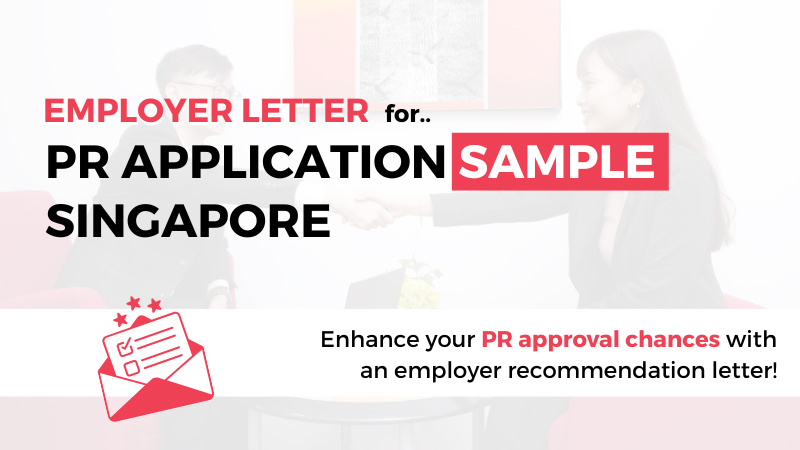Browse through our library of informative resources to stay informed and inspired


While an employer recommendation letter isn’t a mandatory item on the ICA’s checklist for Singapore PR application, it remains one of the most compelling documents you can include to boost your chances. It’s a powerful way to show that Singaporeans or long-term residents believe in your contribution to the local society and workplace.
In an immigration landscape shaped by the holistic COMPASS framework for work passes, Singapore’s PR selection process is more competitive than ever. Every supporting document you submit should make a strong case for you. A letter from your employer can humanise your application, presenting you as more than just a resume or salary declaration.

ICA officers reviewing your application don’t know who you are beyond your paperwork. A solid employer letter serves as a trusted voice from someone local—someone who has seen you work, interact, contribute, and grow in Singapore.
It reflects:
In short, it backs up the claims you’ve made on paper with a real testimonial.
Your current employer is the best person to write this letter, especially if you’ve been with the company for a significant time. This should ideally be your direct supervisor, department head, or a C-level executive who knows your work. A past employer can also be a good choice, especially if you had a strong working relationship and ended on great terms.
Don’t stress if your boss is unsure what to include. Share a guide or this format with them to make it easier.
There’s no fixed template—but a great letter typically includes these key sections:
If your employer knows you on a personal level, they could mention:
(Section for removal) The following points from the old version are removed as they are low-impact and can be found in other documents:

Here’s what a strong paragraph might look like:
“Jane is dependable and consistently delivers high-quality work. She has become a go-to person in our department due to her problem-solving skills and positive attitude. Beyond work, she frequently engages in company volunteer events at the local community centre and maintains a warm rapport with her Singaporean colleagues.”
Or something more results-driven:
“During our major system migration last year, John’s leadership was instrumental. He led the team that successfully completed the project 15% ahead of schedule, resulting in significant cost savings. His ability to mentor junior Singaporean analysts has also been invaluable in upskilling our local talent pool.”
Yes, absolutely. If you’re a business owner or freelancer, a client or business partner can also provide a recommendation. The tone should still be professional and include:
“Working with Alex over the past three years has been a pleasure. His firm’s ability to troubleshoot complex business challenges efficiently saved us significant time and costs. His honest communication and professionalism have earned our full trust”
It doesn’t stop at employers. Other people who can vouch for your character and integration include:
These letters are usually more personal in tone and should focus on your efforts to adapt and contribute socially:
Quality over quantity. Aim for two to three solid, well-written recommendation letters. A mix of professional and personal letters is ideal. For instance, one from a direct supervisor, and another from a Singaporean colleague or friend from a community group. This shows you’ve made an effort to connect with a wide range of people in Singapore.

Keep in mind that an employer recommendation letter is not a golden ticket. It’s a supportive piece of the puzzle, not the whole picture.
Your application still needs to meet all ICA requirements and stand strong in every aspect like employment, education, integration, and more.
But when written sincerely and tailored to your actual contributions, a recommendation letter can provide that added layer of credibility and depth.
The post-pandemic economy and the full implementation of the COMPASS framework have solidified a new baseline for applicants. ICA now has richer data on an applicant’s profile before they even apply for PR. This means your application must demonstrate value beyond just meeting a salary threshold. There is a greater emphasis on applicants in key growth sectors (e.g., AI, fintech, sustainability, advanced manufacturing) and those who show deep local integration. An employer letter is crucial to highlight contributions that COMPASS scores alone cannot capture.
Not everyone knows how to write a recommendation letter that hits all the right notes. If your employer, friend, or client is struggling, it might be worth getting professional help. Immigration consultants can guide them through the process or help draft a letter for their review and approval.
At the end of the day, your recommendation letters should reflect the real you: someone who contributes, connects, and truly wants to be part of Singapore.

Yes, it is possible, but your chances depend heavily on the scheme you’re applying under. If you’re applying through the PTS scheme, active employment is a primary consideration. However, if you’re applying under the Family Ties, Global Investor, or Foreign Artistic Talent schemes, employment is not the main criterion. Still, a strong profile with solid supporting documents is essential.
Yes, Singapore PR status is not permanent if you do not uphold your responsibilities. It can be lost if you:
While the technical minimum is 6 months of payslips, it is highly advisable to wait at least 12 to 24 months. ICA looks for a consistent track record of employment and tax contributions in Singapore. Applying too early may suggest a lack of long-term commitment. A longer history strengthens your profile significantly.
Generally, Work Permit (WP) holders are not eligible to apply for PR directly through their own merits. The primary route is for S Pass and Employment Pass holders. The only common exception is if a WP holder is married to a Singapore Citizen or PR and applies under the Family Ties Scheme.
Singapore PR is difficult to obtain because of high demand, limited spots, and a highly selective approval process. ICA looks beyond basic eligibility and focuses on long-term contribution, stability, and fit within national goals.
To improve your chances, build a solid track record in Singapore, maintain strong employment, and present a well-documented application that shows you’re here for the long haul.
Let me know if you’d like help reviewing your profile or preparing key documents to improve your application.
Please share with us some details about your needs, we will get back to you.